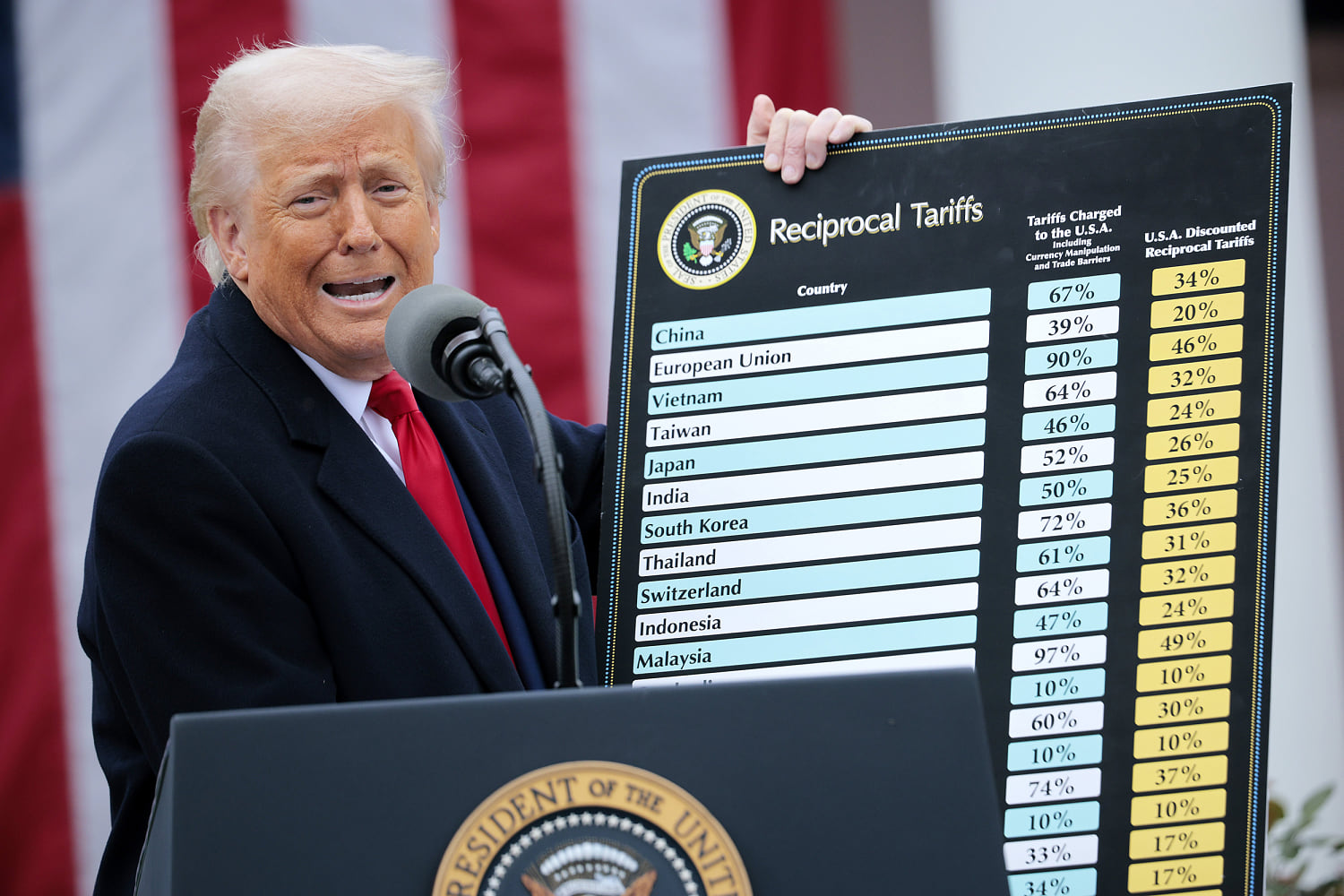
After President Donald Trump “liberated” Americans from a strong economy Wednesday, the Senate held an extraordinary vote. By 51-48, the chamber passed a privileged resolution authored by Democratic Sen. Tim Kaine of Virginia that would revoke the tariffs Trump imposed on Canada earlier this year. Four Republicans — Rand Paul and Mitch McConnell of Kentucky, Lisa Murkowski of Alaska and Susan Collins of Maine — voted with every Democrat to rebuke the president’s trade policy.
In practical terms, for now, Kaine’s resolution means little. The president is plowing ahead with his new, far larger tariffs. “The markets are going to boom, the stock is going to boom, the country is going to boom,” Trump told reporters Thursday, amid the worst day for the S&P 500 and the Nasdaq since 2020.
But the Senate vote, one of the first significant legislative losses of Trump’s second term, highlights an opening for Democrats with ramifications beyond even the global economy.
Even before this week, Republicans were already looking to duck votes on Trump’s tariffs.
Most obviously, Trump’s new tariffs create more chances for Democrats in Congress to jam up their GOP counterparts. The president’s handling of the economy already polls poorly, and most Americans are skeptical of his tariff policies in particular. They have good reason to be: The Yale Budget Lab estimates that the price increases from all of Trump’s tariffs are equivalent to “average per household consumer loss of $3,800,” with lower-income households hurt most.
But Republican lawmakers can’t just blame Trump. Though the executive branch typically controls tariff policy nowadays, the Constitution grants Congress the tariff power. Republicans on Capitol Hill may not have initiated a trade war with the penguins of Heard Island, but they could end it tomorrow.
Even before this week, Republicans were already looking to duck votes on Trump’s tariffs. The funding bill Congress passed last month included a provision preventing a vote on ending the emergency Trump claimed to impose tariffs on Canada and Mexico.
But Republicans won’t be able to avoid these difficult votes entirely. Rep. Gregory Meeks, D-N.Y., is exploring a “discharge petition” to force a vote on Kaine’s resolution in the House. Kaine himself plans a similar vote regarding the tariffs Trump announced Wednesday. Most significantly, on Thursday Republican Sen. Chuck Grassley of Iowa joined with Democratic Sen. Maria Cantwell of Washington to introduce a bill to require the president to notify Congress within 48 hours of imposing new tariffs. Congress would have to ratify the new tariffs within 60 days, or they would expire. Sen. Thom Tillis, R-N.C., said he would vote for the bill, becoming the sixth Republican to break with Trump’s tariff policy. Even Sen. Ted Cruz, R-Texas, said he was against imposing “high tariffs in perpetuity.”
For Democrats, these votes are win-win situations. The more Republicans block these bills, the easier it is for Democratic challengers to hang those votes around GOP necks next fall. On the other hand, if these votes can make GOP defections from Trump even a little regular, that will complicate Republican policymaking enormously.
Trump’s clout keeps the wheels of Republican lawmaking turning.
Since Trump’s inauguration, two factors have controlled the execution of Republicans’ legislative agenda. First, their narrow majorities in the House and the Senate require near-unanimous support. Just this week, House Speaker Mike Johnson attempted to block a bill from Rep. Anna Paulina Luna, R-Fla., that would allow proxy voting for new parents in Congress. Only seven other Republicans joined Luna in opposing Johnson’s move. But that was enough, combined with all 213 Democrats, to defeat the speaker (who immediately and huffily sent the House home early for the week).
As with Kaine’s resolution, Johnson’s loss was largely symbolic. For the GOP to avoid more significant defeats, however, every faction of the party must be on board with bills before they reach the floor. Getting near-universal buy-in is a time-consuming process, and it threatens to grind the bill-writing to halt. So far, though, those delays have been minimal, because of the second factor: Trump currently can command GOP unanimity on demand.
Ahead of multiple crucial votes this year, individual Republicans’ qualms have vanished under pressure from the president. Even before Inauguration Day, Trump headed off a far-right rebellion that could have delayed or even prevented Johnson’s re-election as speaker. In the lead-up to last month’s government funding bill, he persuaded the Freedom Caucus to back the legislation with far smaller cuts than the right-wing group has demanded in the past. Most recently, several Senate Republicans held up a budget resolution in hope of demanding bigger spending cuts. “But a meeting with Trump Wednesday morning,” reported Punchbowl News, “changed everything. Suddenly, deficit hawks were warming to the plan. [Senate Majority Leader John] Thune and other Republicans attributed the difference to Trump.”
In short, Trump’s clout keeps the wheels of Republican lawmaking turning. If his grip weakens even slightly, Johnson and Thune can’t rely as easily on Trump’s bully pulpit to smooth over intraparty disputes. Longer negotiations mean fewer bills and less damage the GOP majority can cause the country.
“The most important economic question right now,” former Council of Economic Advisers chair Jared Bernstein wrote Thursday, is “will [Trump] back down?” The most important political question, likewise, is: Will Republicans in Congress back down from their complete fealty to Trump?
For now, fear keeps the GOP lawmakers in line — fear of even a single cross word from Trump. Changing that calculus even slightly might just stop the destructive tariffs, save the economy and short-circuit Republicans’ congressional majority in the process.
